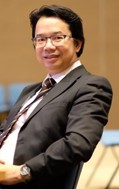This study aims to further develop research on the Tripartite Education System (TES) for Thailand and the ASEAN region. The collaboration between governmental agencies, industries and education institutions (universities, technical colleges) in a Public-Private Partnership (PPP) has proven to be of benefit in achieving a workforce able to cope with the challenges of the labour market in an Industry 4.0 environment. However, there is still debate on how to organize the PPP specifically. This essay gives some insights into three variants of the Thai School-in-Factory (SiF) model implemented at the Rajamangala University of Technology Lanna, which will be called Collaboration A, Collaboration B and Collaboration C. The analyses are done by reviewing existing documents on the projects (such as Memorandums of Understanding), and the review will show similarities and differences in collaboration structure, elements and concepts, objectives, roles of educational institutes and industries, curriculum, and finally, criteria and processes for student selection.

Dr.Niwat Moonpa
Assistant Professor
Rajamangala University of Technology Lanna (RMUTL)
Thailand
Field of expertise/main research projects:
Asst. Prof. Dr. Niwat Moonpa is one of the well-known researchers in the fields of mechanics, materials, and engineering design for the industry which are based on the Public-Private Partnership (PPP) in Thailand. He is a former vice-president of Rajamangala University of Technology Lanna (RMUTL) which is one of the leading universities in Thailand for implementing work-integrated learning through cooperation with private enterprises. In 2020, he wrote a book about the PPP project based on the results of the pilot project implemented at RMUTL. Currently, he is a project co-director for Progressing Work-based Learning of TVET system in Thailand (ProWoThai), the joint international research project that aims to further develop TVET system in Thailand through Work-based Learning (WBL) approach that relies on the concept of participatory action research. Asst. Prof. Dr. Niwat Moonpa is also the project director of the “Tripartite Education System Using Work-based Learning”, the Thai government research funding for producing qualified human resources through cooperation among universities, TVET colleges, and private companies in Thailand. In addition, he is also leading the Industrial Research Program on WiL (Work-integrated Learning): SiF (School-in-Factory project platform since 2013. He is graduated in Mechanical Engineering from King Mongkut’s University of Technology North Bangkok (KMUTNB), Thailand, and received the French government scholarship for his doctoral research.



